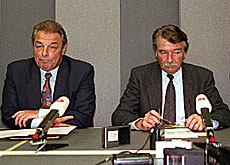René Felber on why Switzerland should join the EU

Ten years after the Swiss voted against joining the European Economic Area (EEA), the issue of European Union membership is off the political agenda, says a former foreign minister.
René Felber, a keen supporter of membership, told swissinfo he still believes the country should join.
Switzerland’s rejection of the EEA prompted the government to seek alternate ways of forging closer ties with the EU.
Its efforts led to a series of seven bilateral agreements governing issues such as trade and the free movement of people. These came into force on June 1, although some will not be fully implemented for several years.
The government is in the process of negotiating a new set of agreements to further strengthen ties and secure admission to the EU’s Schengen and Dublin agreements governing borders and asylum.
swissinfo: You were very disappointed by the Swiss refusal to join the EEA. With hindsight, do you think you would now react in the same way?
René Felber: Without a doubt. It marked the collapse of a project we were presenting to the Swiss people: the chance to participate in building the Europe of which we are a part, at least geographically.
Over the past ten years, the French-speaking Swiss seem to have lost their enthusiasm for the EU. How do you interpret this change?
It’s quite understandable, given that politicians are not in any way committed to Switzerland joining the EU. They are content to solve problems on an ad hoc basis. Europe is no longer on the political agenda.
Ten years ago, the enthusiasm of the French-speaking Swiss was stimulated by the fact that a number of cabinet ministers were strongly committed to this project. But now there is no such commitment – and so no project.
But haven’t the bilateral agreements with the EU also played a part, since they have enabled Switzerland to achieve its main objectives – such as the free movement of people – without giving up sovereignty in other areas?
I’m sure that has played a part. Everyone is talking about the bilateral agreements. But, despite the claims made by opponents of EEA membership, the bilateral agreements are not an easy way forward.
Negotiations with Brussels are still going on, but they are very difficult. In the final analysis, bilateral agreements are just a stopgap measure.
On 6 December 1992, there was talk of a great gulf between French and German-speaking Swiss citizens. Do you think this gulf has widened or narrowed since then?
It hasn’t really become any wider. It’s true that there are gulfs between people in Switzerland, but these are not just linguistic ones. There is also a gulf between town and country, which makes it difficult to mobilize general support for a project.
Moreover, the difference between French and German-speaking Swiss over Europe is no longer as acute as it was; many German-speaking Swiss now realize that we need to join Europe. But they are not saying so because no one is asking them the question.
Clearly, though, we need to go on insisting that Switzerland would not lose its identity by joining the EU. Italians have not become Danes and Poles will not be identical to Spaniards. Identities have not been merged into one. The same is true here in Switzerland: being part of a federal Switzerland has not wiped out the differences between, say, the people of Neuchâtel and those of Schaffhausen.
Ten years ago, some predicted that a “no” to membership of the EEA would be catastrophic for the Swiss economy. Have they been proved right?
We clearly stated that the effects would be felt in the long term, not in the first ten years. Moreover, the bilateral agreements have to some extent made up for the negative effects of the December 6 decision.
But these bilateral agreements are more difficult to negotiate and agree upon today than were the terms of EEA membership ten years ago, because European legislation is constantly developing. So the cost of coming into line with the EU is growing all the time.
However, our greatest loss has been a loss of political freedom. The government and Parliament spend their time amending Swiss laws to bring them into line with EU legislation. We’re not formally obliged to do so, but we can’t afford to do otherwise.
More generally, we’re paying the price of not being part of a powerful bloc. In isolation, we present an easy target. This was true in the case of dormant assets [held by Holocaust victims] and the same will be true of the South Africa issue [in which Swiss banks are being sued for dealing with the apartheid regime].
And we’re also gradually losing our influence. We are no longer listened to, no longer needed, and no one calls on our services…
If you were still in the government, what would you do to relaunch the debate on Europe?
I would insist on the idea that we belong to Europe and that this is an important political project in which we should be involved.
I would also ask people to draw up a catalogue of our needs in terms of relations with the EU, and to consider whether we can live without such relations – or whether in fact they are absolutely vital to our interests.
swissinfo, Olivier Pauchard
René Felber is a long-standing campaigner of Swiss membership of the EU.
He believes that the issue has fallen off the political agenda since the Swiss voted no to membership of the European Economic Area in 1992.
He also says a series of bilateral agreements with the EU are just a stopgap.
Switzerland has been put at a disadvantage, he adds, because it follows the EU’s lead in setting laws, but cannot influence the process.

In compliance with the JTI standards
More: SWI swissinfo.ch certified by the Journalism Trust Initiative



You can find an overview of ongoing debates with our journalists here. Please join us!
If you want to start a conversation about a topic raised in this article or want to report factual errors, email us at english@swissinfo.ch.